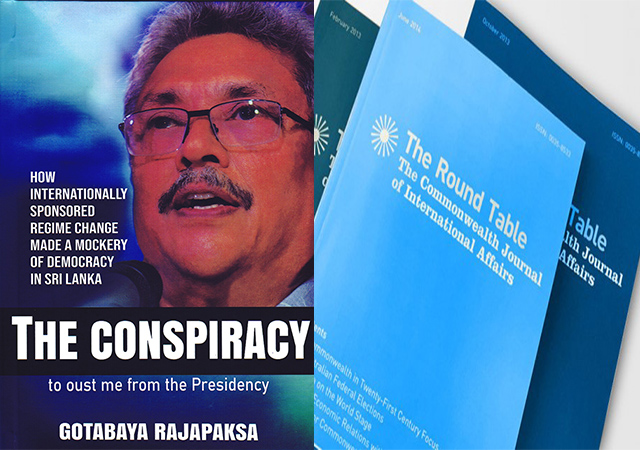
[This is an excerpt from an article in The Round Table: The Commonwealth Journal of International Affairs.]
I have met Gotabaya only once and that was in a Chinese restaurant in Singapore. My wife and I introduced ourselves and had a pleasant conversation until our guests arrived. After he assumed duties as President, he nominated me as the Chairman of the Securities and Exchange Commission; even though his Secretary Dr P. B. Jayasundera notified the Secretary to the Treasury, Mr Attygalle, to issue my letter of appointment, I never received it; instead a person from the Attorney-General’s Department was parachuted to that position.
‘Parachuted’ to key positions such as those described above is not an isolated event. There were similar occasions when the decisions of the President were overruled or ignored with impunity. As Gotabaya now reveals, there were some conspirators within his own establishment. Some of his so-called trusted ‘lieutenants’ presumably had their own game plan from the time he became the President and it is four years later that we hear words similar to ‘Et tu, Brute?’.
I am glad that Gotabaya decided to put pen and paper together, even though the book has appeared several years after he opted to flee from Sri Lanka. However, notwithstanding its late appearance it does help to dispel many misconceptions around the man, his strengths and weaknesses.
Gotabaya’s book has an Introduction, 13 chapters and a Postscript. Individual chapters describe his achievements, things that apparently went wrong and the probable reasons for the failures. A subject-index would have been useful as certain matters have been repeated in different chapters.
Gota gone: Sri Lankans depose Rajapaksas – but how much will change?
Sri Lanka, one-time Asia’s role model becomes a bankrupt nation
According to the old English idiom there can be ‘many a slip twixt the cup and the lip’ but too many slips will not augur well for the future. Gotabaya has addressed some of his so-called failings but revisits almost every controversy during his tenure. David Cameron adopted a similar approach in his book where he finally concludes that his decisions were always the right ones. A classic example is President Rajapaksa’s abrupt ban on chemical fertilisers and pesticides in April 2021, in favour of organic cultivation. He is inclined to believe that there was an internal conspiracy to sabotage his policy directive. The controversy over Chinese imports and laboratory certifications caused delays. In Hans Christian Andersen’s ‘Emperor’s New Clothes’ story, it was a small boy who had the courage to tell the King that he had been hoodwinked by the weavers who played on the emperor’s vanity by saying that the suit he was wearing was only visible to people who are clever and competent. In Gotabaya’s case there was no small boy; instead there were incompetent advisors who failed to caution him in time that the policy was not working. Neerja Chowdhury points out in her book how important it is for Prime Ministers to have good and frank advisers and gives examples of those Prime Ministers who benefitted or did not benefit by having a good team of advisors.
The COVID-19 pandemic was competently handled by Gotabaya who sought advice of professionals on technical matters. Its beginning and end were during a very difficult period in Sri Lanka’s post-independent history. The country was facing a situation of bankruptcy with low external reserves. Fuel, drugs and food shortages together with huge losses in the tourist industry exacerbated suffering by families and the export industry with the consequent loss of public trust. Pressure to prosecute war crimes was mounted by the United Nations and certain Western powers sympathetic to the cause of the Liberation Tamil Tigers of Eelam. India to a large extent and China to a lesser extent provided lines of credit; the process was assisted by Gotabaya’s brother Basil, who was then the Finance Minister.
Over the fertiliser issue, there were demonstrations and satyagrahas in most parts of the country. These were the red flag indicators or the precursor to thousands flocking to Colombo for what was then described as a massive people’s protest or a satyagraha in the Gandhian sense for a system change. When the term aragalaya was coined, it was clear that there were hidden forces – both internal and external – acting behind the scenes. When the armed forces turned a blind eye to large numbers of people running amok trying to enter public properties, he decided not to order opening fire on them, and arranged to flee the country. He thus prevented a massive blood bath and sacrificed his own job.
Due to his short tenure in office, it is difficult to draw up a balance sheet of his successes and failures. Certainly the tax concessions were a major boon to the public and corporates but it was not accompanied by other revenue generating measures. The Easter Sunday attacks took place during the time when President Sirisena was in power; however, Gotabaya feels that the Catholic Church unfairly tried to implicate him in having orchestrated the barbaric acts.
Dayanath Jayasuriya is President’s Counsel, Colombo, Sri Lanka.
The conspiracy to oust me from the Presidency – how internationally sponsored regime change made a mockery of democracy in Sri Lanka by Gotabaya Rajapakse, Colombo, Gotabaya Rajapakse, 2024.



